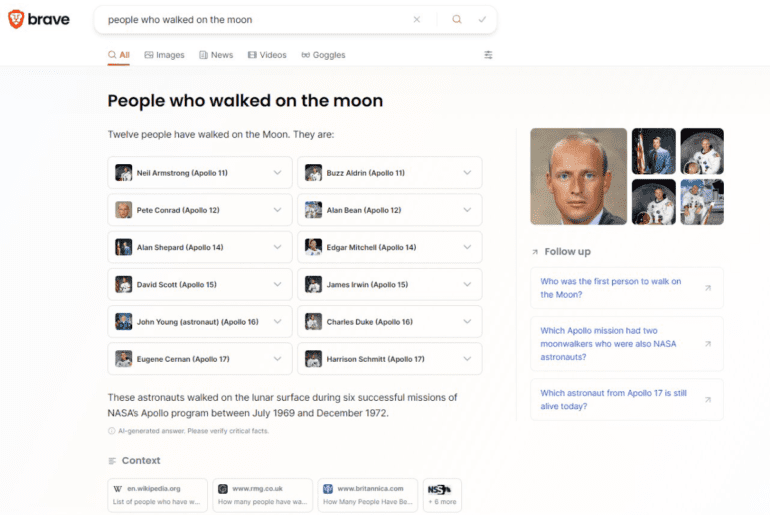- Brave Search introduces “Answer with AI” feature for synthesized responses to user queries
- AI-powered search utilizes large language models (LLMs) and custom transformers for semantic matching
- Concerns arise regarding the potential impact on content publishers and web ecosystems
- Competitors like Google, Bing, Perplexity, and You.com are also exploring AI-driven search solutions
Main AI News:
In a strategic move towards improving user experience, the privacy-centric search engine Brave has announced a significant upgrade to its answer engine, which is now integrating AI-generated responses. Rolled out globally, the new “Answer with AI” feature delivers meticulously crafted answers to diverse inquiries, ranging from historical facts like “People who walked on the moon” to practical queries such as “How to descale Nespresso pixie.”
This innovation marks a substantial advancement from the platform’s previous AI-driven summarization feature introduced in March 2023. Brave positions this development as a pivotal enhancement, surpassing conventional search capabilities.
Brave emphasizes the automatic integration of AI for informational queries, streamlining the process of presenting summarized information. Users can seamlessly access comprehensive responses by simply entering their queries, with the system leveraging large language models (LLMs) like Mixtral 8x7B and Mistral 7B, alongside tailored transformer models for semantic matching and answering.
Josep Pujol, Head of Search at Brave, elucidates, “The user only needs to enter a query as they are used to doing with a regular search engine. The query will then be internally converted to an LLM prompt using the data from search results as context to the prompt, with typical RAG (retrieval augmented generation).”
While AI-driven search promises enhanced efficiency, concerns loom over its potential ramifications for web ecosystems. Brave acknowledges this challenge, recognizing the impact on content publishers. As the platform contends with evolving user demands for AI-augmented answers, it remains committed to mitigating disruptions to content dissemination.
“This challenge is not unique to Brave Search but present across most AI-powered answer engines and chatbots, premium or open. Consequently, we will be monitoring and quantifying the impact of AI-generated content on site visits, and eventually will address the disruptions that the drop in traffic could cause,” the company asserts.
The emergence of AI-powered search extends beyond Brave, with industry giants like Google and Bing also exploring AI-driven responses. Concurrently, newcomers like Perplexity and You.com are positioning themselves as contenders in the evolving landscape of answer engines. As the quest for streamlined information retrieval intensifies, the convergence of AI and search technology continues to shape the digital frontier.
Conclusion:
The integration of AI into Brave Search represents a significant advancement in information retrieval, catering to evolving user demands for streamlined and comprehensive responses. However, the potential ramifications for content publishers underscore the need for vigilant monitoring and adaptation strategies. As competitors intensify their exploration of AI-powered search solutions, the market is poised for continued innovation and disruption in the realm of information retrieval technologies.

